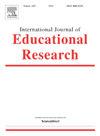The strength of adult community education as a professional field in aid-receiving countries: A global mixed-methods study
IF 2.5
3区 教育学
Q1 EDUCATION & EDUCATIONAL RESEARCH
引用次数: 0
Abstract
Community education is a form of organized adult learning focused on locally shared social, economic, and environmental goals with a long history in many countries around the world. This mixed-methods study proposes and tests a model to identify factors influencing the global development of professional training and research in community education, particularly in low-and-moderate-income, foreign aid-receiving countries. A quantitative analysis of 66 countries finds per-capita aid is unrelated to strength of professional community education, but nonviolent grassroots activism, income inequality, and government fiscal decentralization were significant predictors when controlling for civil liberties, GDP per capita, and educational infrastructure. Interviews with community education researchers and practitioners in two aid-receiving (India, South Africa) and, for comparison, two non-aid-receiving countries (China, United States) were qualitatively analyzed. Key informants in India and South Africa diverged regarding the role of the government in their respective contexts and the strength of community education professional training, research, and support in their country. Informants’ perspectives were more aligned in China and the U.S. These observations suggest national or local community education policies and funding could help rich, poor, and especially highly unequal countries develop stronger professional training and programs.
受援国成人社区教育作为专业领域的实力:一项全球混合方法研究
社区教育是一种有组织的成人学习形式,侧重于当地共同的社会、经济和环境目标,在世界上许多国家都有很长的历史。这项混合方法研究提出并检验了一个模型,以确定影响社区教育专业培训和研究的全球发展的因素,特别是在低收入和中等收入的外援受援国。对66个国家的定量分析发现,人均援助与专业社区教育的强度无关,但在控制公民自由、人均GDP和教育基础设施时,非暴力的基层行动主义、收入不平等和政府财政分权是重要的预测因素。对两个受援国(印度、南非)和两个非受援国(中国、美国)的社区教育研究人员和从业人员的访谈进行了定性分析。印度和南非的主要信息提供者对政府在各自背景下的作用以及各自国家社区教育、专业培训、研究和支持的力度存在分歧。这些观察结果表明,国家或地方社区教育政策和资金可以帮助富国、穷国,特别是高度不平等的国家发展更强大的专业培训和项目。
本文章由计算机程序翻译,如有差异,请以英文原文为准。
求助全文
约1分钟内获得全文
求助全文
来源期刊

International Journal of Educational Research
EDUCATION & EDUCATIONAL RESEARCH-
CiteScore
6.20
自引率
3.10%
发文量
141
审稿时长
21 days
期刊介绍:
The International Journal of Educational Research publishes regular papers and special issues on specific topics of interest to international audiences of educational researchers. Examples of recent Special Issues published in the journal illustrate the breadth of topics that have be included in the journal: Students Perspectives on Learning Environments, Social, Motivational and Emotional Aspects of Learning Disabilities, Epistemological Beliefs and Domain, Analyzing Mathematics Classroom Cultures and Practices, and Music Education: A site for collaborative creativity.
 求助内容:
求助内容: 应助结果提醒方式:
应助结果提醒方式:


